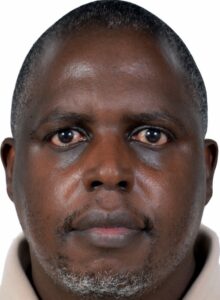ASLE’s Scholar of the Month for July 2021 is James Wachira.
 James Wachira is a Kenyan PhD student at the Bayreuth Graduate School of African Studies whose doctoral research is about non*human matterings in selected Kenyan eco-texts. He is the author of “Animal Praise Poetry and the Samburu Desire to Survive” in Natures of Africa: Ecocriticism and Animal Studies in Contemporary Cultural Forms (ed. Fiona Moolla) and “Wangari Maathai’s environmental Afrofuturist imaginary in Wanuri Kahiu’s Pumzi” in Critical Studies in Media Communication (2020).
James Wachira is a Kenyan PhD student at the Bayreuth Graduate School of African Studies whose doctoral research is about non*human matterings in selected Kenyan eco-texts. He is the author of “Animal Praise Poetry and the Samburu Desire to Survive” in Natures of Africa: Ecocriticism and Animal Studies in Contemporary Cultural Forms (ed. Fiona Moolla) and “Wangari Maathai’s environmental Afrofuturist imaginary in Wanuri Kahiu’s Pumzi” in Critical Studies in Media Communication (2020).
How did you become interested in studying ecocriticism and/or the environmental humanities?
I attribute my interest in studying ecocriticism to Evan Mwangi’s inspiration. In 2004, Mwangi published an article, “Nobel Prize: A Shot in the Arm for African Eco-Criticism,” in the Sunday Nation. The same year, Wangari Maathai had been named the 2004 Nobel Laureate. I had always been yearning to write about Wangari Maathai’s environmental activism. I resolved to pursue a master’s degree at Moi University and possibly write a thesis that engaged ecocriticism and environmental humanities. Before joining Moi University for my master’s, I taught at St. Theresa’s Secondary School, Wamba. This school is in Samburu County in the North-Central of Kenya. While in Samburu, I came face to face with unexplainable neglect of environmental knowledge that the community archives and mediates in praise chants to camels, cattle, donkeys, goats and even sheep. Upon joining Moi University, I wrote my master’s thesis on Samburu animal oral praises. While still a master’s student at Moi, I got a chance to join and present part of my master’s research during the ASLE-UKI 2013 Biennial Conference. I made my presentation, for the first time, via Skype. This conference opened a window for me to explore and learn more. When I began my PhD at the Bayreuth International Graduate School of African Studies (BIGSAS), I received grants to participate in the 2015 and 2017 ASLE conferences. The conferences keep replenishing my interest in ecocriticism and environmental humanities.
Who is your favorite environmental artist, writer, or filmmaker? Or what is your favorite environmental text? Why?
This question is tricky. During my PhD research, I have become aware of “neglected” artistic productions. Some of these items exist as chants, oral poetry, narrations etc. For example, I am referring here to the numerous performances that the Samburu and the Maasai employ to think with and about their environment. As a result, I am beginning to appreciate such artefacts as a source of some of the Kenyan writers. I am alert to the influence of Gĩkũyũ oral narratives in the filmic productions of Wanuri Kahiu and Wangari Maathai’s influence on such Kenyan authors such as Ng’ang’a Mbugua and Henry ole Kulet. Wangari Maathai’s environmental activism draws from such knowledges. Hence the resolve to keep reading Kenyan communities’ art. Since I am still reading, I would instead refrain from foreclosing myself to a favorite artist, writer, or filmmaker.
What are you currently working on?
I am currently working on a paper for a special issue on an aspect of East African literature to be published with the Journal of African Cultural Studies. In addition, I am also preparing for my PhD defense. I also welcome and think about my post-PhD life.
What is something you are reading right now (environmental humanities-related or otherwise) that inspires you, either personally or professionally? Comment briefly on why or how it inspires you.
I am reading Evan Mwangi’s The Postcolonial Animal: African Literature and Posthuman Ethics. The book is a crucial state of the art for the article I am writing and a project I am contemplating after the defense of my PhD.
Is there a scholar in the field who inspires you? Why?
While I have several scholars I admire in the field. However, I would always have in my list Evan Mwangi and Hubert Zapf. I love the way these authors demonstrate the potency of literary studies in the development of environmental humanities.
